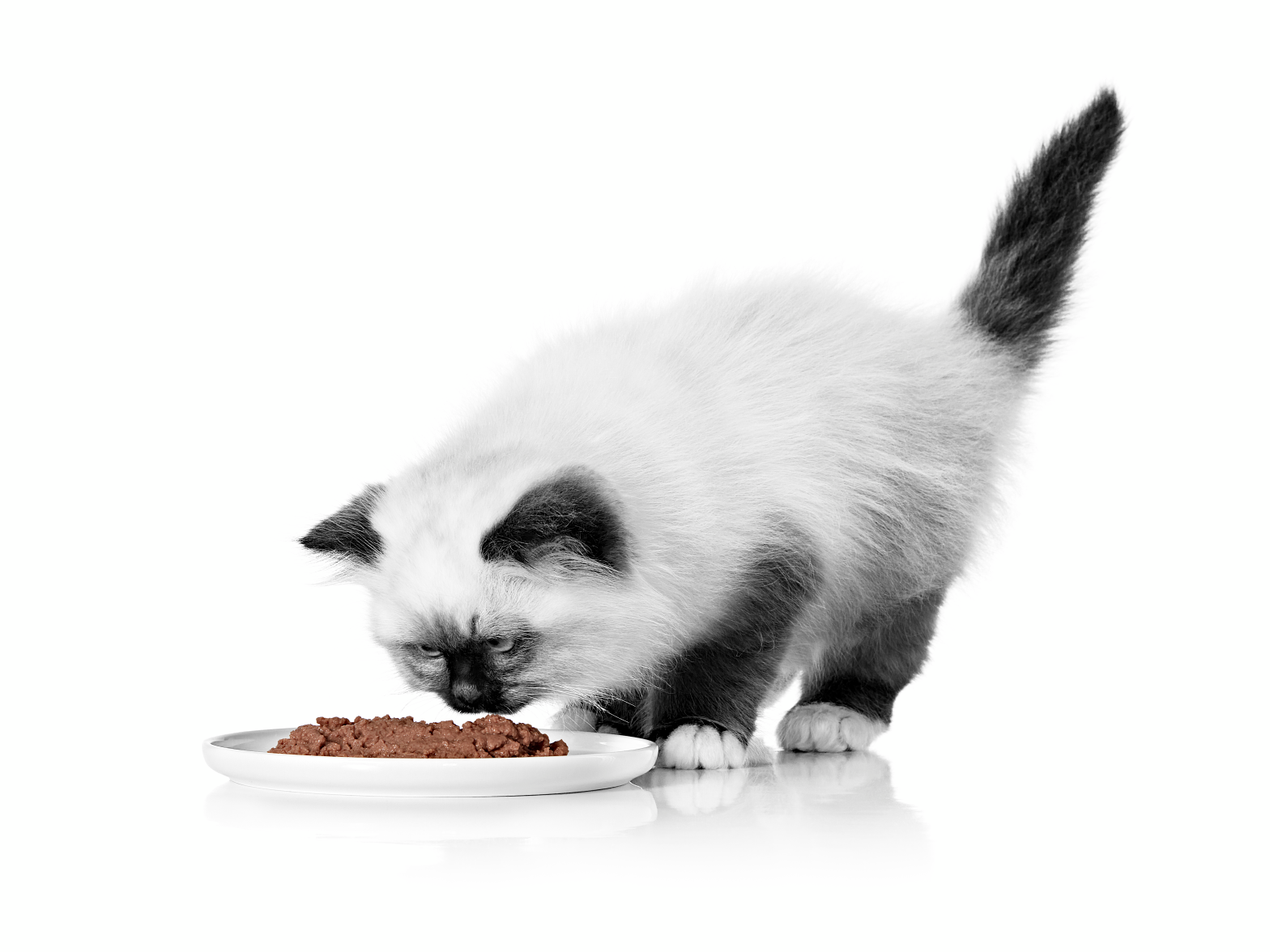
Kitten feeding and nutrition guide
Rapid growth, discoveries and development just about sum up the first few months of your kitten’s life. Knowing what to do to feed your kitten from the start is vital to support their healthy growth. During their first year, you’ll watch your new pet’s transition from tiny fragile kitten to an independent and curious young adult cat. Most cat breeds reach adulthood at around 12 months but some take longer—Maine Coons, for example, reach adulthood at around 15 months. In nutritional terms, the first year is a delicate stage of a cat’s life. As their bones grow and harden and their brain matures at an incredible pace they need energy, protein and other nutrients. Choosing a food that gives the right balance of all of those will support your kitten’s development and set them up for a long and healthy life.
Kittens versus adult cats: how feeding needs differ
The nutritional needs of kittens are very different from those of adult cats (and completely different from those of humans). Their food should contain more energy and protein than adult cat food, to support bone and muscle growth, as well as plenty of antioxidants to help them build up their immunity. As they explore, play and crucially grow, kittens need food that is adapted to their diminutive size but gives them the right balance of nutrients to support their development. While kittens’ nutritional needs can differ from breed to breed, as a pet owner, you’ll also get to know your own kitten’s unique needs.
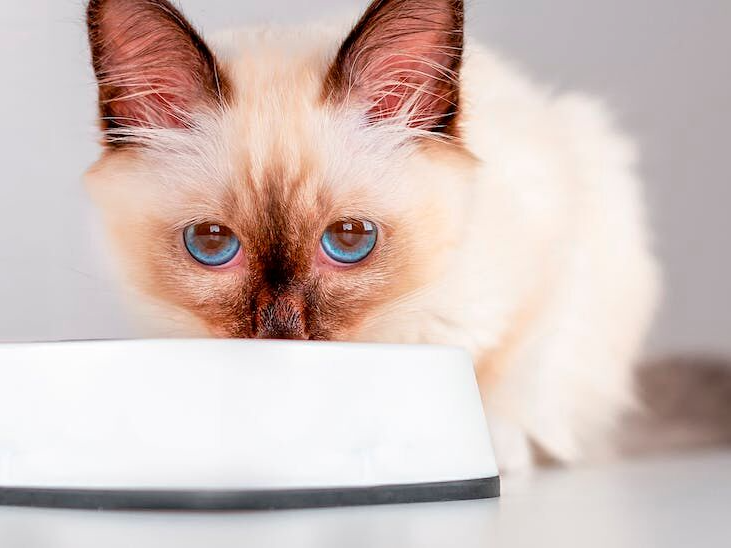
Foundation for growth: why your kitten’s diet is so important
From the outside it may look like it’s all play, napping and cuddles but your new pet is going through an intense period of growth. It’s important that your kitten’s food is up to the task of supporting their development. After all, the smallest and newest member of your household has an impressive list of nutritional requirements. Their food needs to be easy on their fragile digestive system and adapted to their tiny mouth and teeth. A diet that lacks the right nutrients in the right amounts can affect development. Kittens need protein to support the growth of their muscles and skeletons, for example. Not getting enough can cause joint and bone problems in later life. While kittens are protected by their mother’s immunity at birth, this protection fades and their food needs to contain antioxidants to help build up their own, immature, immune system, especially in the period before they are vaccinated.
What does healthy development look like?
While for all kittens, the pace of growth is intense in the first months of life, that growth differs from one breed to another. Most cats will reach adulthood between 12 and 15 months of age. But the diminutive Singapura (the smallest recognised breed of cat) won’t have the same nutritional requirements at the same stage as its more imposing Maine Coon or Persian cousins. It’s important to consult a chart that gives kitten feeding guidance by age and breed and it’s a good idea to speak to your vet for advice tailored to your cat. That way you can be sure your kitten’s food is giving them the right support for their rapid development.
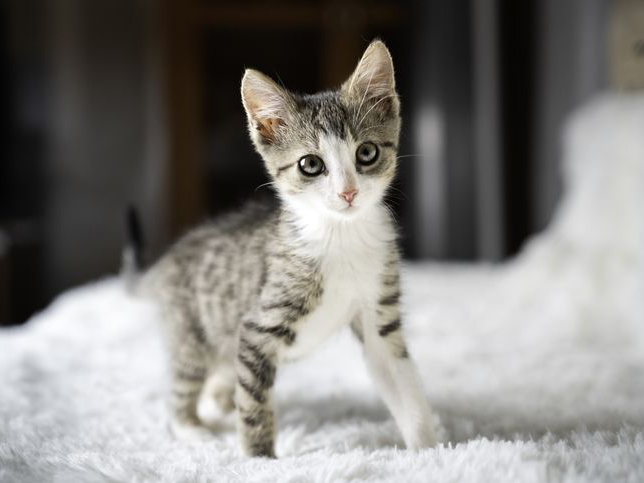
Birth to 4 months
At this early age, your kitten is growing at a lightning-fast pace. A week-old kitten has only just opened their eyes. Fuelled by their mother’s colostrum, which fuels their immunity, and then milk, they gain around 10-30g (0.3-1 oz) of weight per day. Fast forward to a month old and that tiny bundle has already transformed into an inquisitive and playful, if diminutive, explorer. They’ll be ready to start weaning, a vital process as the kitten transitions from complete dependence on their mother for their nutritional needs, to independence. The weaning process is usually completed at around two months. Their first food needs to be soft, to smooth the transition from milk to solid food, and full of the antioxidants they need to build their immunity as well as amino acids to aid muscle and cell growth.
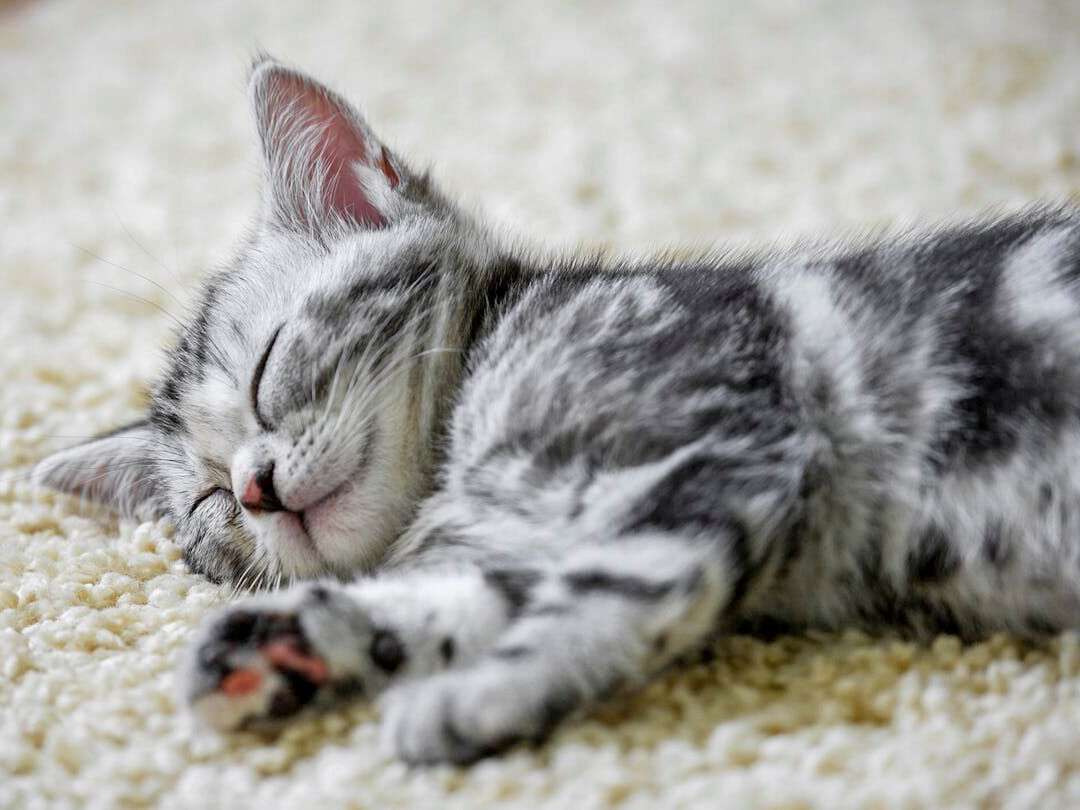
4 to 12 months
Your kitten’s growth is continuing and they are developing strong muscles and bones. Growth is at its most intense at around four or five months, when your kitten could be gaining around 100g (3.5oz) a week. They need a more energy-dense food—a food that contains more calories per gram—than adult cats. But at first, it must be one that little mouths can manage while they’re waiting for their adult teeth. Keep a close eye on portion sizes to ensure your kitten does not put on too much weight during this growth phase. At this age, kittens are busy playing and also honing their social skills. During this period your cat will go through puberty and you may notice that they start to behave more like an adult cat. That could include sleeping for as much as 13 to 16 hours a day. Well, all that growing, developing and socialising is tiring work.
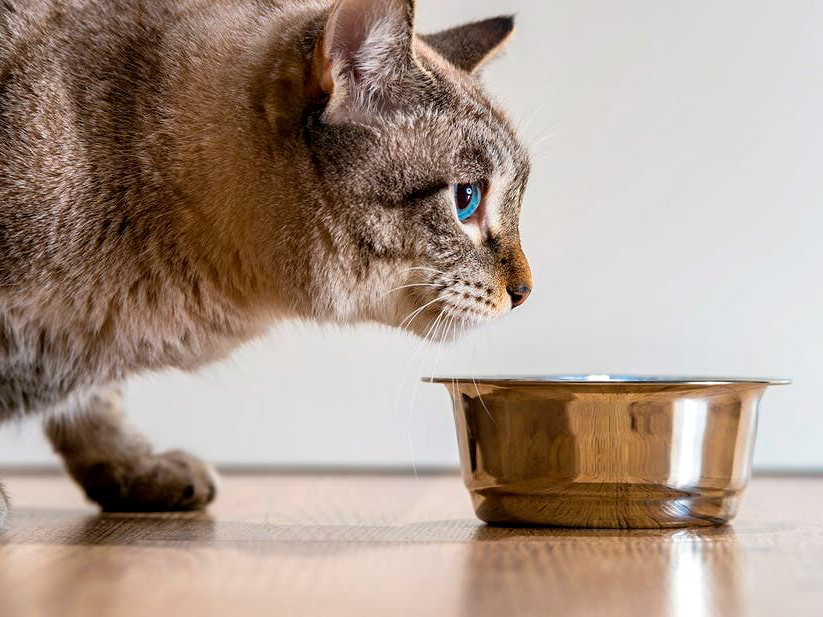
Adult cats
When your pet is around a year old you’ll say goodbye to the kitten phase and settle into life with an adult cat. Your pet’s adult teeth are in place, meaning they are ready for adult food. Ask your vet for help on managing that transition. Your cat’s food no longer needs to be so energy-dense but they still need essential nutrients such as amino acids including taurine and vitamins A and D. You’ll need to decide whether to feed your cat wet or dry food (or both) and select the right one for them, taking into account their way of life and activity levels. Feeding your cat the correct quantities is important to avoid them putting on excess weight.

Birth to 4 months
At this early age, your kitten is growing at a lightning-fast pace. A week-old kitten has only just opened their eyes. Fuelled by their mother’s colostrum, which fuels their immunity, and then milk, they gain around 10-30g (0.3-1 oz) of weight per day. Fast forward to a month old and that tiny bundle has already transformed into an inquisitive and playful, if diminutive, explorer. They’ll be ready to start weaning, a vital process as the kitten transitions from complete dependence on their mother for their nutritional needs, to independence. The weaning process is usually completed at around two months. Their first food needs to be soft, to smooth the transition from milk to solid food, and full of the antioxidants they need to build their immunity as well as amino acids to aid muscle and cell growth.

4 to 12 months
Your kitten’s growth is continuing and they are developing strong muscles and bones. Growth is at its most intense at around four or five months, when your kitten could be gaining around 100g (3.5oz) a week. They need a more energy-dense food—a food that contains more calories per gram—than adult cats. But at first, it must be one that little mouths can manage while they’re waiting for their adult teeth. Keep a close eye on portion sizes to ensure your kitten does not put on too much weight during this growth phase. At this age, kittens are busy playing and also honing their social skills. During this period your cat will go through puberty and you may notice that they start to behave more like an adult cat. That could include sleeping for as much as 13 to 16 hours a day. Well, all that growing, developing and socialising is tiring work.

Adult cats
When your pet is around a year old you’ll say goodbye to the kitten phase and settle into life with an adult cat. Your pet’s adult teeth are in place, meaning they are ready for adult food. Ask your vet for help on managing that transition. Your cat’s food no longer needs to be so energy-dense but they still need essential nutrients such as amino acids including taurine and vitamins A and D. You’ll need to decide whether to feed your cat wet or dry food (or both) and select the right one for them, taking into account their way of life and activity levels. Feeding your cat the correct quantities is important to avoid them putting on excess weight.
Feeding kittens wet versus dry food
The science behind ROYAL CANINⓇ kitten nutrition
We specialise in health through nutrition, tailored to meet the unique needs of every kitten. For us, feeding your kitten isn’t just about building their body and providing energy—it’s about supporting them too. We provide an optimal balance of nutrients to support defence against disease as well as for energy, cell growth and maintenance.
It’s a good idea to know how much to feed your kitten before they arrive. How much they should eat will depend on your new pet’s breed, exact age and stage of development. Once you’ve worked out how much they should have, make sure you weigh their daily food ration. If you’re wondering how many times a day to feed your kitten … well you may find that they decide for themselves. Cats are natural grazers and often capable of regulating their own intake through multiple tiny meals a day. While not true for all cats, if it applies to yours, leave out a bowl of suitable food (not surpassing their total daily food ration) and allow them to follow their instincts.
From around a month old, the vital weaning process begins for your kitten, and is usually completed at the age of around two months. Between four and 12 months, as your kitten’s body develops rapidly, their food needs to supply plenty of energy to support their growth. Once your kitten has reached adulthood, usually around a year (although it depends on their breed), the focus is no longer on rapid growth but their food still needs to supply the nutrients they need to maintain their health, tailored to their breed, lifestyle and stage of life.
Create the right feeding environment for your kitten
Cats can be sensitive about their food—not just what they eat but the conditions in which they eat it. Try to create a quiet and calm feline feeding space, without disturbances. They should be out of sight and with an easy escape route. It’s no surprise that they don’t like their food bowl to be anywhere near their litter box but you should also keep your kitten’s food and water bowls apart to avoid food falling into the water. Ideally, your kitten’s feeding area should not be in your own dining area. It’s not a good idea for cats to eat human foods—their digestive systems are different and human foods can harm their health. Keeping the two areas separate will reduce the temptation to let them nibble on leftovers.
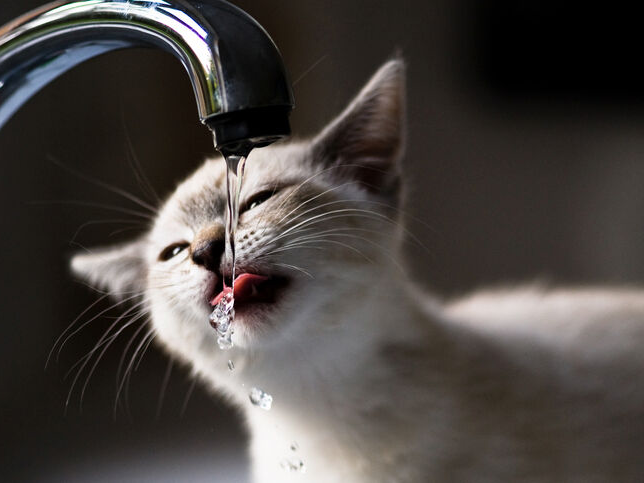
How much should your kitten drink?
Kittens should drink around 60 ml (around 2 oz) per kg of body weight but you don’t need to get out a measuring cup: part of that liquid comes from your kitten’s food and they will need to drink more or less depending on whether they eat dry or wet food. The temperature, your kitten’s activity levels and their overall physical condition will also affect their water needs. Just make sure fresh, clean water is always available, ideally in several calm spots around your home. It should be topped up at least daily. Bowls should be washed regularly to prevent pathogens from growing in them. Glass, porcelain or metal dishes are best: some kittens can be put off by the smell of a plastic bowl.
The food your kitten eats provides the foundation for their healthy growth, which is why getting it right from the start is so important. Once you’re confident that your kitten is eating the right food with the right nutrients for their breed and stage of development you’ll be able to relax and enjoy this exciting stage of your pet’s life.